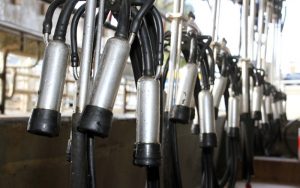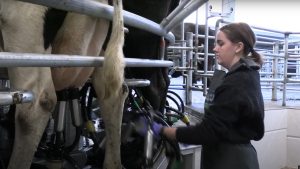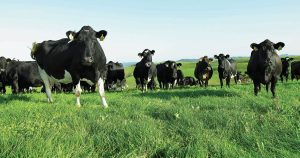
Economics agency Infometrics says Timaru district’s economy grew 4.3 per cent over the year to June 2021, slightly ahead of the national growth rate of 4.2 per cent.
The agency predicts the country’s economy will grow by 3.6 per cent during 2022, although its September 2021 Quarterly Economic Monitor showed economic activity dipped 3.7 per cent pa in the quarter, as Delta temporarily brought parts of the economy to a standstill before rebounding.
South Canterbury with its large dairy and meat plants, productive primary sector and solid industrial base can expect to be part of the 2022 economic growth and to again exceed the national rate.
One factor giving confidence was Timaru district’s dairy payout for the 2020/2021 season was approximately $440 million, $35 million higher than the previous season.
This upward trend is expected to continue, with Fonterra forecasting the season’s price will range from $7.25 to $8.75 per kilogram of milk solids to between $7.90 and $8.90 per kilo of milk solids. BNZ and Westpac are predicting an $8.90/kgMS milk price, ANZ at $8.80/kgMS and ASB at $8.75/kgMS.
A massive boost for Timaru also came in November when Antarctica New Zealand named Timaru and PrimePort Timaru ahead of Lyttelton for its $344m rebuild of Scott Base. A total of 700 jobs will be created during the duration of the six-year project and 170 jobs at its peak.
A constant flow of central government money will now enter the local economy together with other add-on benefits. The associated publicity from the project will put Timaru more firmly on the map nationally, and perhaps even internationally.
Another positive sign for Timaru, has been a net outflow of Kiwis out of the cities with provincial centres benefiting.
In the past year, net migration increased for Timaru district.
Infometrics says Kiwis are moving to provincial centres for economic opportunities, lifestyle and to find cheaper housing away from the wildly spiralling prices in the cities.
Timaru has plenty of work which should act as a strong drawing point.
The downside impacting Timaru is the uncertainty remaining for the tourism, hospitality and events sectors, shortage of labour, especially skilled labour, and supply chain issues.
By the end of the year, builders were reporting chronic shortages of timber, steel and other materials. How this will impact the start of the Scott Base rebuild project is difficult to gauge.

Opinions have varied over a large retail development at the former showgrounds site. CBD business and building owners have expressed concner about the potential impact on the main street, while others view the development as being positive and an addition to what already exists.
A further challenge for CBD business owners is the increasingly pressing requirement to earthquake strengthen their buildings. Costs are increasing all the time, making it more difficult.
Getting the region’s exports out of the country has also become problematic in recent months.
Disruptions to supply chains bringing goods into the region are expected to hit harder in 2022, placing pressure on businesses.
Farmers’ morale took a hit during the year, many of them feeling aggrieved by increasing regulations and government reforms. A Groundswell protest was held in July followed by another in November, which saw hundreds of farmers and rural people driving tractors, utes and cars through Timaru and other South Canterbury towns.
Yet with strong prices for dairy and meat, overall, in spite of frustrations and difficulties, not the least of them Covid-19, many of Timaru’s businesses will enter 2022 with confidence.
The Timaru Herald spoke to people in the business community to get their views on how things are shaping up for them and their thoughts on the future.
Eli Peeti, Mobile Meat Master Ltd

Undaunted by Covid-19, Ely Peeti decided he would take the bold step of starting his own business seven months ago.
He had worked nine years for a mobile abattoir business.
“I was also running a taxidermist business on the side, but Covid did that business, it became not viable.”
Struggling to keep it afloat, he opted to start his own company.
“It was very difficult for a start. It took a lot of investment and time to prepare and three months to establish the company.”
Early each week, Peeti travels to farms, slaughters cattle and sheep, takes the carcasses to process at Washdyke, boning, slicing and packaging, making a range of smallgoods, sausages and patties, then returns the meat to the farmers.
“I’m a service provider and do it all myself, 100 per cent. It’s great that way because everything is done correctly.”

Peeti said it was not difficult building a client base since he was well known in the industry.
“The business was slow in the first few months but since then I’ve been busy.”
Farmers wanted the better quality meat that came with home kill, Peeti said.
“I pride myself in what I do and how the animals’ lives are ended. I drive out to the paddock, where they’re happy, and boom. Then I do the skinning and gutting on farm, then it’s into the chiller truck.”
Peeti also provided a wild game butcher service.
“I don’t expect Covid to affect me too much.”
In 12 months’ time he hoped to either relocate to a bigger farm or to acquire a building to expand further.
George Steven, Timaru farmer

When The Timaru Herald spoke to George Steven in August 2020 he was working 100 hours a week on his dairy/deer farms at Otipua and Fairview because of a shortage of workers.
His labour concerns have since eased.
“We found a young Kiwi guy from Timaru who has been very good, and he has engineering skills which have been very useful.”
His farm manager from the Philippines had considered taking his family to Australia also due to residency concerns, but this was expected to be sorted.
“It will give him a lot of flexibility and security.”

The occasional “Wwoofer” (volunteer worker who usually helps for board and food) was also passing through, which had been a help, he said, and weather wise it had been an excellent spring, although production was slightly down on last year.
Steven said dairy prices were looking “fantastic,” beef prices were at record levels also and sheep prices were good.
“I have no complaints.”
He did not take part in the Groundswell protests.
“It’s a bit hard to protest when you’ve got record prices. I’m not particularly unhappy, although I’m frustrated I can’t expand my irrigation area because of Parker’s (Environment Minister David Parker) announcement last year to end intensive farming in spite of the fact I’ve got enough water to irrigate another farm and consent to do it.”
Steven said velvet prices had gone up a small amount while venison prices were average.
He was looking forward to the new year optimistically.
“It cost a lot doing a dairy conversion, now we need to return on that. The profits will be going straight to the bank to pay off debt. There will be plenty of tax but no new machinery.”
Greg Brosnan, managing director Brosnan Transport and BTL Logistics

Greg Brosnan says the main challenge of the past 12 months has been keeping staff and customers safe and protected,
“And that’s not just in regards to their physical health. I have been particularly watchful of people’s mental health and stress that has been caused by lockdowns, uncertainly and in some cases being kept apart from close family.
“Our business has been very proactive in making sure our staff feel like they can speak with us, and we have been mindful that some days have been better than others for them.”
In the 35 years he has been in the industry, Brosnan had not seen it so busy.
“The supply chain never gets to stop, and because we operate in a rural area, farming is the strength of that chain.

“Although parts of the economy have been paused, ours has not.”
He believed the rural sector will be crucial in getting the country through Covid-19.
“If it wasn’t for the rural sector, this country would be in a very poor state. Our business is heavily involved in rural type work, there’s not many businesses in the South Island that are not.
“Our farmers will be the saviours of our economy in the future.”
He said South Canterbury was “in a good space,” and apart from the pandemic, things were going “pretty well”.
“Over the past two-and-a-half years, Brosnans have invested heavily in new buildings and property in Washdyke.
“It’s a sign that from a distribution point of view, Timaru is a pretty handy spot. Our port is running well, our road and rail connections are strong, and we have plenty of can-do attitude.”
He said he was less impressed by the Government.
“I worry for what the next generation are going to have to pick up and fix. This government has performed poorly for anyone and any business that has been prepared to take a risk, employ people, be good citizens, pay tax and contribute to the wealth and GDP of this country.
“In my view, unless you live in Auckland, this government doesn’t seem to care.
“I think 2022 will be challenging in some parts, most specifically in tourism and retail, and I really feel for them because the Government has forgotten those industries.”
Bailey Grant of B’s Beauty Hub

Bailey Grant, a qualified make-up artist, opened her business in Church St, Timaru, just after the 2020 Covid-19 lockdown.
“I worked part-time out of here for three years prior while being a full-time nanny to quadruplets. That came to an end and I decided to be brave and open a salon in town.”
She said the first year had been challenging.
“This year it was good up until the latest lockdown and then having things like the Bay Carnival, and wine and food festival cancel. It has impacted my business.
“But there are still nice people still doing weddings, photoshoots and things on a smaller scale.”
Grant said this year in lockdown she was fortunate to qualify for a wage subsidy and a resurgence payment for three weeks.

“It stopped me thinking I had to close my doors.”
She said business had been picking up going into Christmas.
As for 2022 she said it had been difficult making decisions for the coming months with the Government’s Covid-19 traffic light system.
“I’ve built my brand on making people feel comfortable. With red and orange I can’t work with unvaccinated people. It puts a lot of pressure on you morally and mentally and with a possible $12,000 fine it’s not easy. I’ve got a handful of unvaccinated clients.”
In the next 12 months she wanted to continue growing her business.
“I’ve got an events hire company as well, hiring out for weddings, birthday celebrations. I’m busy, but there’s always room to be busier.
“It’s nice to see new shops open and people taking risks, especially in the economy at the moment.”























